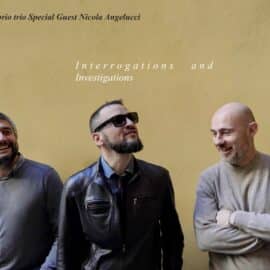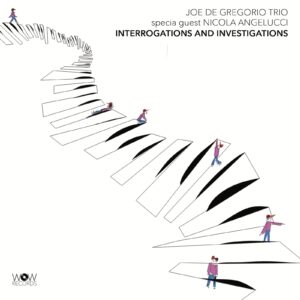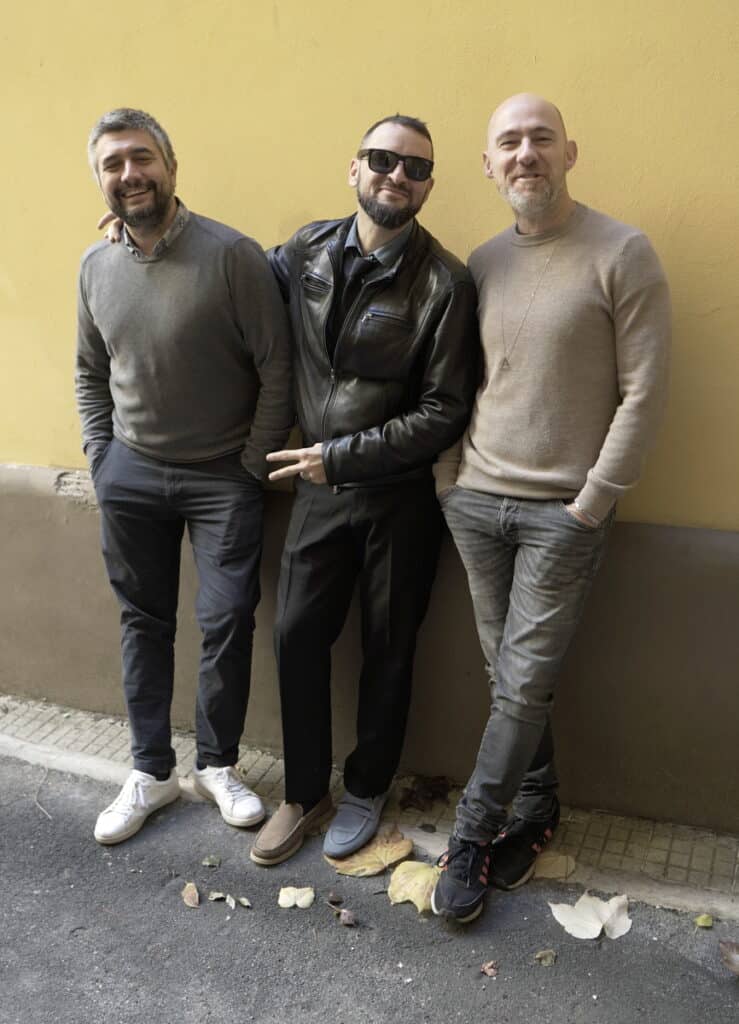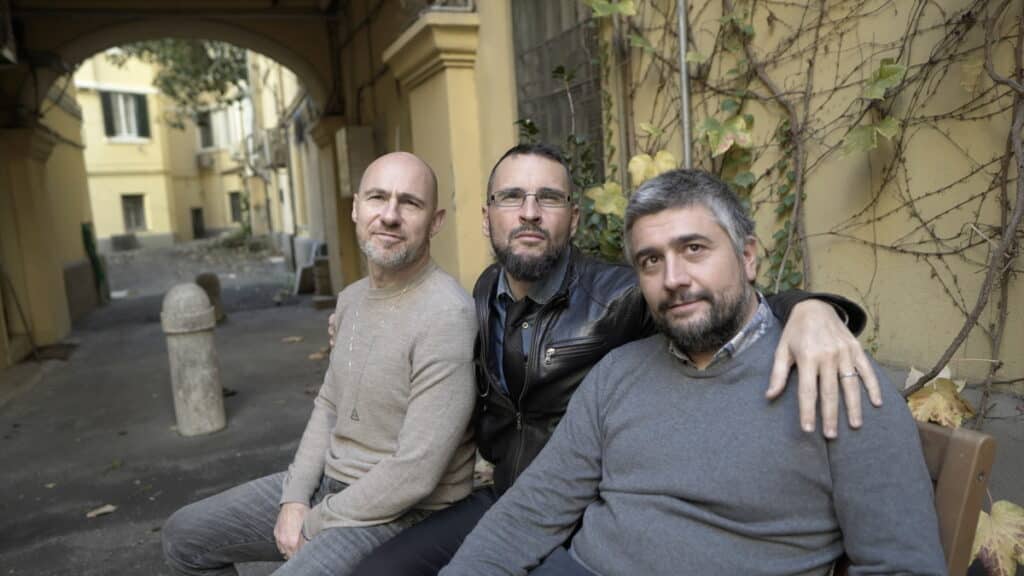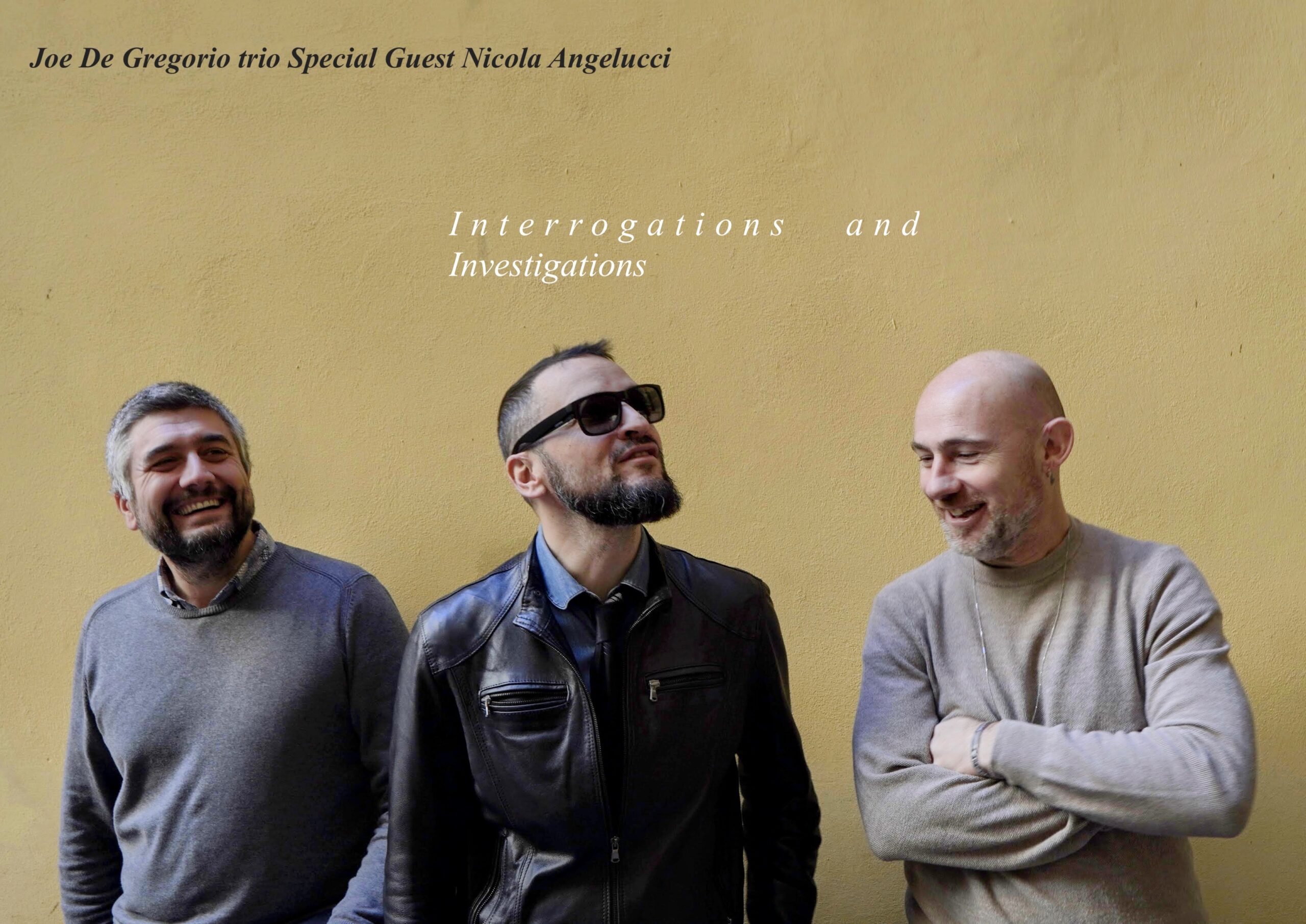
A Cross-Continental Jazz Journey: A Conversation with Pianist, Composer and Educator Joe De Gregorio
By Thierry De Clemensat
Member, Jazz Journalists Association
Editor-in-Chief, Bayou Blue Radio
U.S. Correspondent – Paris-Move/ ABS Magazine/ Jazz Fuel
For European musicians pursuing an international career, the path is rarely straight. For Italian pianist, composer and educator Giuseppe De Gregorio aka Joe De Gregorio, the journey has taken him from Rome to New York.
First as a passionate student, having formative stops at Van Amsterdam’s Conservatory (Netherlands), Perpignan’s Conservatory “La Méditeranée” (France), Gothenburg’s Academy of Music and Drama (Sweden), The New School for Jazz and Contemporary Music of New York and Boston’s Berklee College of Music (USA); later as a full-time professional and internationally awarded Jazz-soloist, Joe’s career flourishes across three continents, performing jazz venues and festivals in Rome, Paris, Barcelona, Casablanca, Monte Carlo, Detroit and New York.
Today, De Gregorio stands as a bridge between cultures, channeling both European lyricism and the soul of American jazz.
We sat down with De Gregorio to talk about his artistic roots, his latest album Interrogations and Investigations, and how he navigates the ever-evolving world of modern jazz.
Thierry De Clemensat (TDC): Joe, thank you for taking the time to speak with us. Let’s begin with Rome, a city I know and admire deeply. For an artist like you, growing up in what is essentially an open-air museum must have had a profound influence. How did the city shape your artistic vision?
Joe De Gregorio: It is such a pleasure for me to be here with you today, Thierry.
Being born in Rome has essentially shaped my relationship with sheer beauty. During my childhood, aside from playing music, I used to draw a lot. That’s how I developed an acute sensitivity to sheer visual shapes and colours. Both Roman’s visual arts and architecture have subconsciously and profoundly influenced my artistic work; for instance, in the way I approach and organize the sonic architecture of the materials I choose to work with, in my research of a certain roundness in my piano touch as well as in the pursuit of harmonious motions within my physical gestures while at the instrument.
Rome offers an infinite variety of lush shapes in terms of its iconic historical buildings, which evokes in me not simply a visual sensation but also a sonic experience, somehow. In other words, Rome taught me that my Music, more than anything else, must convey a sense of intrinsic beauty.
TDC: You began your musical studies in Italy, then continued in The netherlands, France, Sweden and the United States. What are the key differences in musical education across these countries? And how have those varied experiences helped shape your career?
Joe De Gregorio: Being exposed to five different cultures-educational systems (e.g. Italian, Dutch, French, Swedish and American) has been extremely challenging. It forced me to break down the specific mindset behind each one of these cultures in order for me to fully absorb the positive nutrients laying inside each one of these approaches. I’d describe the Italian approach as extremely rooted in the emotion of a cantabile poetry. The Dutch approach emphasized the importance of rhythm in jazz expression. The “French approach” felt extremely organized, quite rational and somewhat reassuring. The Swedish approach provided a mix of the previous three, balancing freedom (creative chaos) and discipline while suggesting the use of “space” as a key component in Music (e.g. ECM recordings). Last but not least I’d describe the American approach as being at its core an infectious “creole” experience, the embodiment of American society’s diverse and multicultural melting pot, directly responsible for Jazz’s birth on American soil (I often argue that Jazz is a God given gift to America to serve as a social tool that shall edify American society in accordance with the ideals advocated in its constitution).
TDC: Watching your earlier videos and performances online, I noticed a clear intention to immerse yourself in the American jazz idiom. While many European artists tend to preserve their continental sensitivities, you seem to have embraced both. On your 2024 album Interrogations and Investigations, the fusion of European elegance and American grit feels natural and seamless. How did you arrive at this musical balance?
Joe De Gregorio: First of all, thank you for making me feel fully understood as an artist; your acute acknowledgement accurately captures the essence of the spiritual tension-aim abiding “my Jazz”. To answer your question, I’d like to use the metaphor of a healthy tree: in order for a tree to have long branches that stretch way far off the trunk while bearing abundant fruit, its roots must go deep into the ground to properly absorb its nutrients.
This is my daily effort: researching the roots of Jazz. Within that rootedness I find the true nutrients (inspiration) and ultimately the freedom to branch out, as I aim to give my personal contribution to this Legacy. I consider that the germ of future innovation is always contained in the seed of its origins.
TDC: You’ve said that music influences your personality, and helps you understand yourself more deeply. Can you talk about that process of introspection through music?
Joe De Gregorio: What a wonderful question. Life, Music in general and particularly Jazz are the Art of balancing opposites. As a classically trained composer, my favorite subject in music has always been counterpoint. The core principle of counterpoint is enhancing a given musical idea through contrast by the use of its opposite pole. Here’s a musical example: assuming we have a two voice invention (e.g. see Bach’s two voice inventions), if the top note (aka the melody) is static (not moving at all) the best way for the second voice to complement the latter is by embracing motion. As human beings we’re filled with inner opposite voices, contradictory feelings and conflicting ideas which if not properly harmonized can generate a lethal cacophony inside of us. Through music practice and artistic expression we learn how to reconcile those inner opposites and bring them into a cohesive harmony.
Music is essentially a mirror – a revealer of our inner nature. What’s more: Jazz as a collective improvisatory practice teaches us to balance our inner opposites even through friction with other peoples’ inner contradictions and struggles;
Such a collective cathartic creative experience, channels an infinite variety of emotional-musical contrasts while allowing human beings to find TOGETHER (e.g; “WE THE PEOPLE”) an overall sense of harmony and cohesion through the exploration of commonly agreed Forms.
TDC: When you describe jazz as a gift to be shared, it echoes the sentiments of greats like Miles Davis, Joe Zawinul, and Wayne Shorter. Would you say there’s also an intellectual or even political dimension to jazz—a form of commitment that goes beyond the music itself?
Joe De Gregorio: Totally. Jazz is a mindset and a lifestyle transcending music itself, meant to be rooted in global openness and social commitment. As a touring musician, in the span of the past 15 years, I lived in 7 different countries, developing fluency in four languages. This multi-cultural exposure has allowed me to interact with people from all over the globe and has forged in me a new identity, which I’d describe as “being a citizen of the world”. Through Jazz, I can see myself as an ambassador for global change through the embodiment of ideals that essentially promote global citizenship. That’s how Jazz provides the solution to solve our planetary challenges, being the actual building tool for a truly global society that will make this world a better place for all.
TDC: Your latest album opens with Lonely Heart, a track that immediately showcases your gift for melody. That melodic strength carries through the entire record. Where does this ability to create such rich, emotionally resonant themes come from?
Joe De Gregorio: I can definitely say that musical genes are in my DNA. I grew up in a musical family, constantly immersed in some kind of music making-listening activity. My mom was a tremendously gifted soul; as an amateur pianist and a singing child prodigy, she had perfect pitch. She had started performing at age 5 Italian opera’s most popular songs accompanied on accordion by her oldest brother aged 7 (my uncle Frank) also a child prodigy; together, they used to form a quite successful duet. My uncle Franck was my first musical model-mentor when I was only three years old. My Father also significantly contributed to my musical education; he was a passionate music lover, religiously listening to both jazz and classical music vinyls while smoking his Toscano cigar as a sacred daily ritual after lunch.
I would add that being born in the country of the“bel canto” was the cherry on the cake.
TDC: Your Sound clearly reflects an American jazz sensibility—it feels like something you’d hear in a top New York club. Would you say this is more the result of your formal training, or of working alongside legends like Ron Carter and Peter Erskine?
Joe De Gregorio: Music in general is the byproduct or relationships, both between sounds as well as between people who shape those sounds. My music essentially springs out of four major sonic sources.
The first source is represented by the sum of sounds I absorb privately during my daily individual musical explorations;
The second source is the sum of sounds I absorb from other human beings either while performing on stage in front of an audience or while recording in a professional music studio.
The third sonic source is the vibration that I absorb from the specific audience I perform for, as its distinctive frequency can inspire my creation.
The fourth and most important source is The Spirit of God’s Presence (Creative Silence). Keith Jarrett said it as follows: “as much as babies do not come from babies music does not come from music rather from silence”.
TDC: What’s your take on the current jazz scene in the U.S.? There seems to be an exciting wave of young talent emerging. How do you see the future of jazz unfolding?
Joe De Gregorio: I’m quite concerned about the young scene and its music making process-approach. To me it feels too often aiming at impressing the spectator by the egotistical show off of individual skills (through a meaningless profusion of notes) rather than sacrificing the ego in favor of enhancing the spirit of “togetherness and cooperation” that always characterized the most influential bands in Jazz’s history (e.g. the Miles Davis quintets, the Keith Jarrett Trio, the John Coltrane Quartet, etc). No wonder! Our world, more and more subjugated by screens, turns human beings into distracted visual animals, having depleted-numbed hearing capabilities.
The visual experience has eaten up the prominence of the sonic experience. The “fake hype” of the “Social media stardom” based on visual bombardment and catchyness annihilates what used to be (and should be) the central element in Jazz music production and fruition: SHEER SOUND AND SOUND ALONE.
The massive outpour of content that floods the web pressures all of us to find “visual means” to become more appealing than our neighbor and somehow manage to grab the attention of the distracted audience through some kind of visual hook or trick. In the golden age of Jazz (or I should say of Music in general) when sound alone meant everything, players had the opportunity to perform long-term contractual engagements (several consecutive weeks of residence at the same venue or long tours) which made it possible for real bands to gather, stay together and develop a strong distinctive sound, both collectively and individually.
Nowadays the lack of long-term professional engagements forces the contemporary Jazz scene to operate more like an ongoing jam session where the show-off “all-star narrative” seem to be predominant. Pursuing “individual notoriety” (and being able to survive) has become the priority for musicians, leading them to switch band mates often. Rare are the occasions allowing band mates to “stay with the music” (and with each other) long enough to dig out an authentically collective sound. Real bands have become more and more rare, even in Pop music. Therefore rare are musicians developing a deep and strong sonic identity-personality. Nevertheless, there’s still exceptions. One good example? The band Vulfpeck; which proves that there is still hope cause a great band is still the sh***.
TDC: You divide your time between Europe and the U.S. Has performing for different audiences shaped the way you play? Are there notable differences between American and European jazz listeners?
Joe De Gregorio: Based on my personal experience, European audiences can be more “brain heavy” or judgmental compared to American audiences, which can be overall more open minded. Regardless of the nature of the audience, a live performance is always the result of a co-creation or partnership between the performer’s subconscious and the audience’s subconscious. Every specific audience has a frequency. My work as a performing artist is identifying that specific frequency and listening to its resonance; if I listen properly I am able to find common tones of resonance that help me connect with the (supposed) listeners.
Once those common hooks of resonances are firmly established I usually leverage them to open unexpected sonic dimensions and bring my audience on some kind of surprising journey. Yet, one element is key in this co-creative process: listening. Active listening is the basic “currency” that the audience is invited to bring to the table of my performance; the more “currency” they invest the easier my job becomes; the less energy they are willing to invest in actively listening the harder it is for me to create at a high level.
TDC: Let’s talk about artistic evolution. I imagine you already have new projects in mind. Can you share what’s next—or perhaps tell us about the inner drive that compels artists like yourself to constantly reinvent?
Joe De Gregorio: I’m currently preparing my next recording session, which will take place in Los Angeles featuring the legendary drummer Peter Erskine. I would describe this new recording project as an homage to one of my favorite soundscapes: ECM’s. Echoing those, my new album will showcase original tunes that I composed while I was living in Gothenburg-Sweden, songs that were inspired by the life changing experience of a full-time immersion in the northern European Jazz Hemisphere and musical sensitivity.
TDC: One final question: If you could give one piece of advice to a young jazz musician navigating a global career today, what would it be?
Joe De Gregorio: Developing an international career can be extremely tricky. Finding the right balance between cultivating a solid local fan base while gradually building International exposure is challenging yet crucial. But my most valuable piece of advice would be rather condensed in this motto: “be faithful in small things”. By small things I mean practicing consistency/integrity in relentlessly cultivating every single valuable human connection-relationship that one runs into locally and internationally, one person at a time. Over time this patient investment will build an extended network. And one day, one of those individual connections, will turn into a golden door granting access to a life-changing opportunity.
TDC: Joe, thank you again for this thoughtful conversation. We look forward to following your next musical explorations.
Joe De Gregorio: Many thanks to you Thierry for your brilliant questions.
::::::::::::::::::
Follow PARIS-MOVE on X
Follow PARIS-MOVE on X
